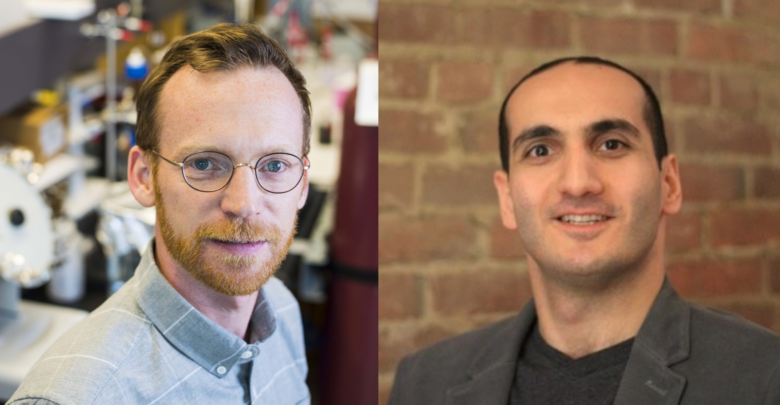 Alessi and Safari
Alessi and SafariTwo University of Alberta researchers are developing a way to access a new energy source, and they say demand is set to double or even triple in the next 10 to 15 years.
The energy source in question is lithium, a metal that powers the batteries in objects like cellphones and electric vehicles. Daniel Alessi, an associate professor with the department of earth and atmospheric sciences, and Salman Safari, a chemical engineer and former post-doctoral fellow, have been researching their method of extracting lithium from the waste waters of the oil and gas industry for the past four years.
The duo’s work has culminated in their own startup, Recion Technologies, which stands for “recovery of ions.”
According to Alessi, a lot of the lithium currently used to make batteries for cars and cellphones come from “environmentally intrusive” sources.
“The nice thing about our technology is [that it uses brines, waste water with concentrated salts] that are already produced by the oil and gas industry. So there’s really little extra infrastructure besides the extraction process itself, or cost in terms of disposal.”
Alessi said this method of extracting lithium contrasts other conventional processes such as open-pit mines that mar the earth’s surface as well as create pollution in the form of tailings, which are waste rocks and minerals. In contrast, Safari said their technology benefits from a “very simple” precipitation process that stands out from the work of other companies in the area.
“It consumes less reagents […] and it produces more or less pure lithium concentrate that doesn’t require much removal of contaminants afterwards,” Safari said. “Other technology still has a lot of contaminants in it, so it would require some polishing and that would increase the total cost of production.”
In addition to requiring less removal of contaminants, while most conventional processes require quite a bit of fresh water to be evaporated, Alessi and Safari believe their process won’t require quite as mch.
“We haven’t done any analysis to see what would be the consumption of water at scale, but the preliminary data that we have [indicates that] our power consumption and fresh water consumption is much less than what they’re using in places such as South America,” said Safari. “We also expect the process to be less energy intensive and generate less carbon dioxide (CO2) compared to other conventional processes.”
While the researchers are currently looking to extract lithium in North America, this process would work for brines with higher levels of lithium as well, such as those found in the salars, salt-basins, of South America.
“Those are the things we’re actively working on as well,” said Alessi, “It’s not that this technology is only applicable in Western Canada.”
The pair said the development of this technology — a combination of nanotechnology and chemistry — started when they conducted a survey of previously existing technologies and honed into what worked.
“It’s just like any similar scientific endeavor,” Safari said. “You experiment a lot of times, and in our case we tried thousands of times. We tried different materials, we tried different conditions, until we fine-tuned the process.”
Alessi and Safari said they’re now ready to test their product in the field. According to the researchers, a single lithium extraction plant can produce 1,000 tonnes of lithium, sometimes more. Recion expects to achieve similar results for their process, relative to the size of the plant.
“The idea is that we could then replicate that module many times if we wanted to,” said Alessi. “You can adapt the size [of the operation] to the site that it’s [working] on.”
Currently, the researchers are limited in how much lithium they can extract in the lab. They said they are seeking an industry partner in Alberta and beyond to use their technology in processing plants.
“In the lab, we’re really limited to [processing] a dozen litres [of brine] per day,” said Alessi. “That’s a gap that we need to step through right now so we’re scaling up our entire process and working out the speed bumps that come when you scale things up. [We’re looking for] someone with access to brine that can support us in doing that.”
From there, Alessi hopes they can start a demonstration plant and then full operations.
“We’re also thinking about developing other technology that we can [use to] extract ions other than lithium,” Safari added.
Looking even further ahead, the two researchers are poised to take advantage of an opportunity that they said can help change Alberta’s oil and gas industry for the better.
“There’s clearly a major pivot now,” said Alessi. “When I was a kid, I heard ‘We’re going to get away from oil and gas.’ It seems like now, the pivot is really happening, and one great evidence of that is the move towards electric vehicles and transportation in a really serious way around the world.”




